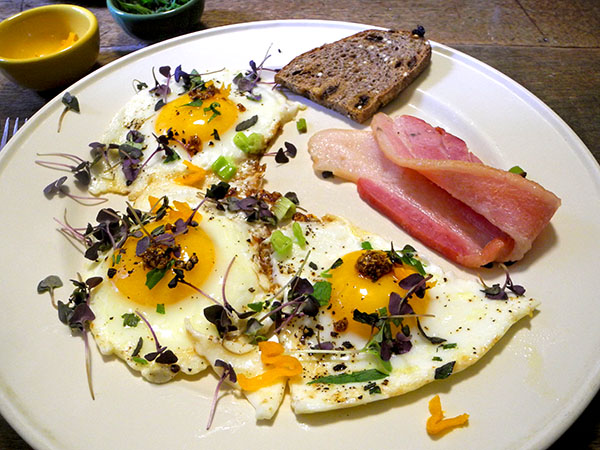
After the luxury and pleasure of another Sunday breakfast like this one, I could almost be tempted to forgo making any meal that does not involve eggs in one form or another. I won’t, if only because I wouldn’t want dishes like this to ever become routine.
But these ‘breakfast’ forms are pretty easy to assemble, and they open themselves up to infinite variations; I’ve hardly even begun to go there.
This one was made non-routine, in an unanticipated way, when I picked up a neat-looking loaf of bread at Whole Foods a few days ago (I didn’t have the time to hunt further, as I normally would). There was noting in its appearance behind the small cellophane window, or in the name on the label itself, that would have indicated it was a raisin bread.
It was a raisin bread. I almost never buy raisin bread. It makes a difference if your bread has raisins.
It did this time. It was actually a very interesting addition to what was already a pretty diverse company of flavors in this breakfast.
- eggs and thick bacon from Millport Dairy Farm; sliced Japanese red scallions from Norwich Meadows Farm; one small mild Grenada yellow seasoning pepper from Eckerton Hill Farm (flavor of a habanero, a fraction of the heat); some rich nonpareil ‘Kerrygold Pure Irish Butter‘; a mix of 5 chopped herbs remaining from last night’s meal (parsley, julip mint, and lovage from Keith’s Farm; marjoram and rosemary from Stokes Farm); Maldon sea salt, freshly-ground ‘India Special Extra Bold’ Tellicherry peppercorns; a Middle-Eastern-style seasoning blend, ‘L’eKama‘ from NY Shuk; organic whole wheat raisin bread from Whole Foods, toasted only lightly; and micro basil from Two Guys from Woodbridge
- the music, this being a Sunday, was ‘sacred’ (nothing is sacred to us, but it’s a Sunday morning tradition here), one of Giovanni Gabrieli‘s early 17th-century Sacred Symphonies, the 50-minute-long, Symphoniae Sacrae II (1615). An aside: I may be wrong, but I believe the world would not hear another ‘symphony’ that long for almost 200 more years, or another choral symphony before then either